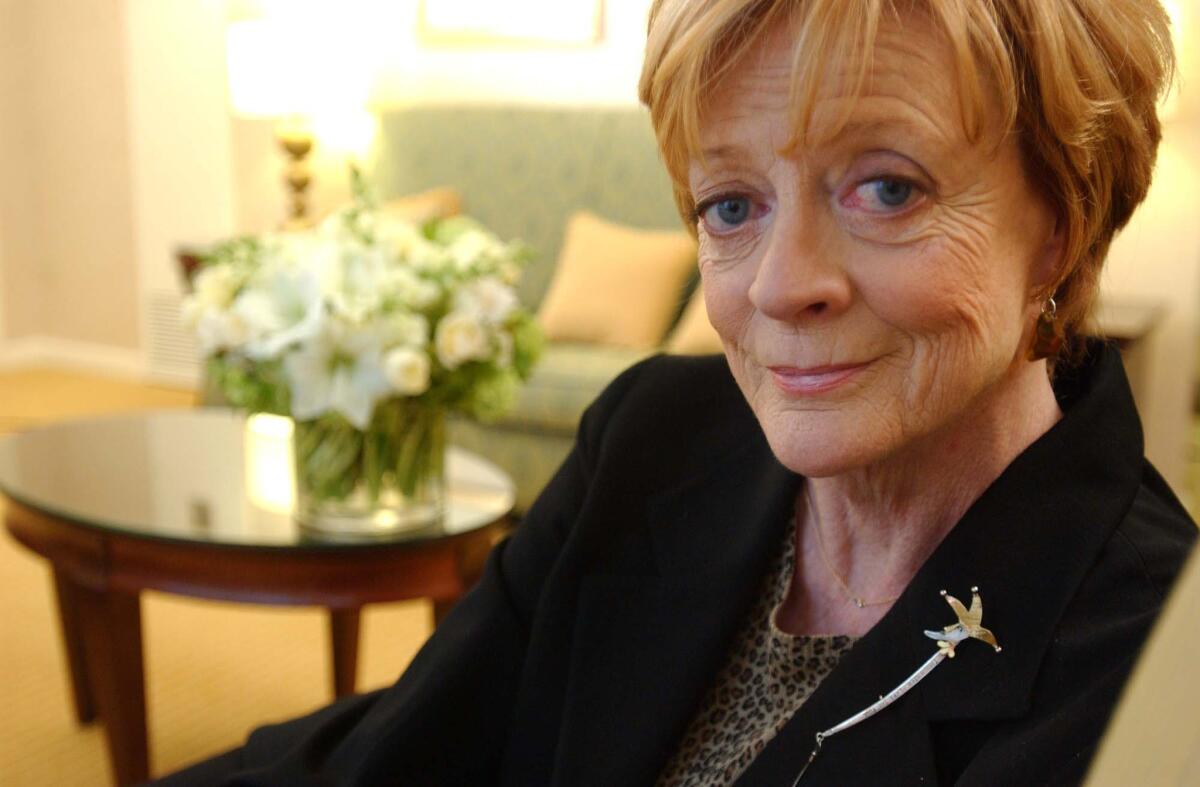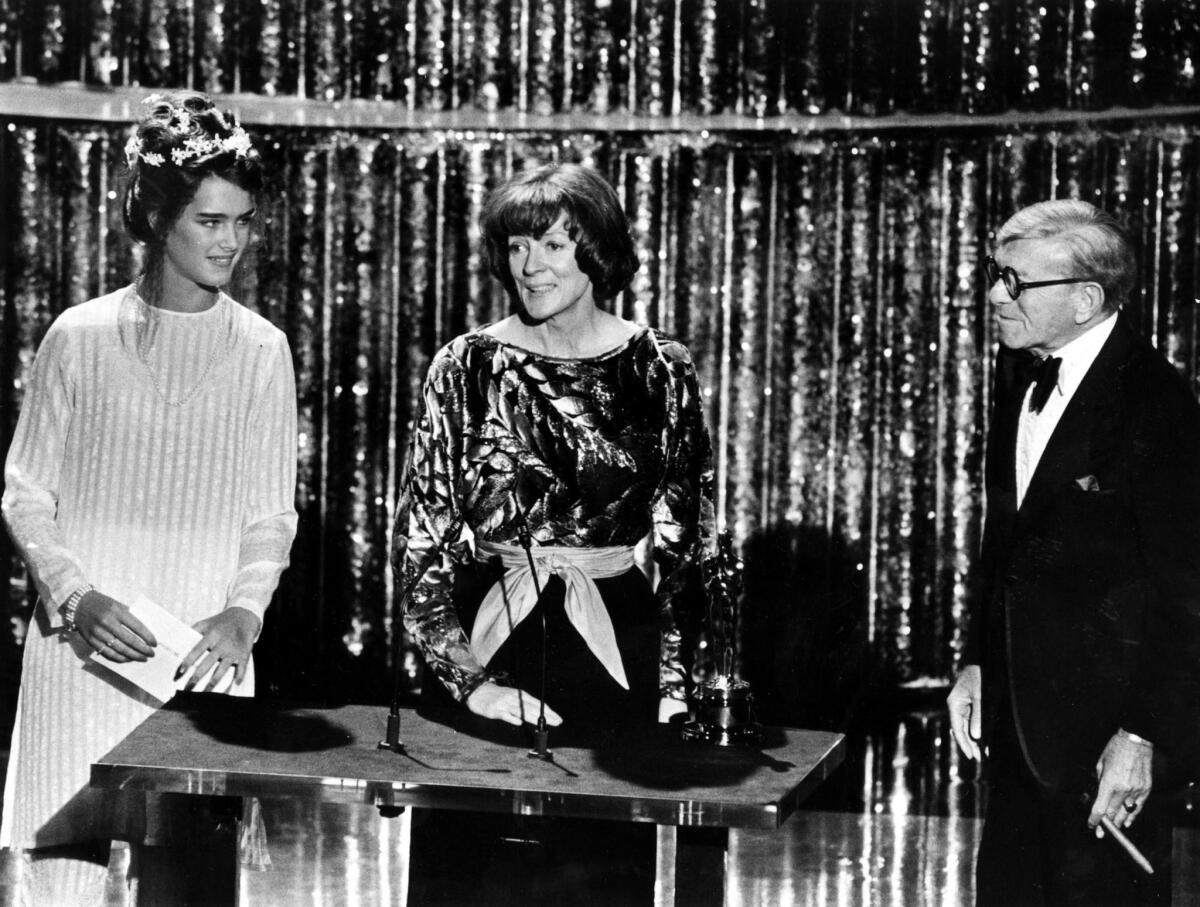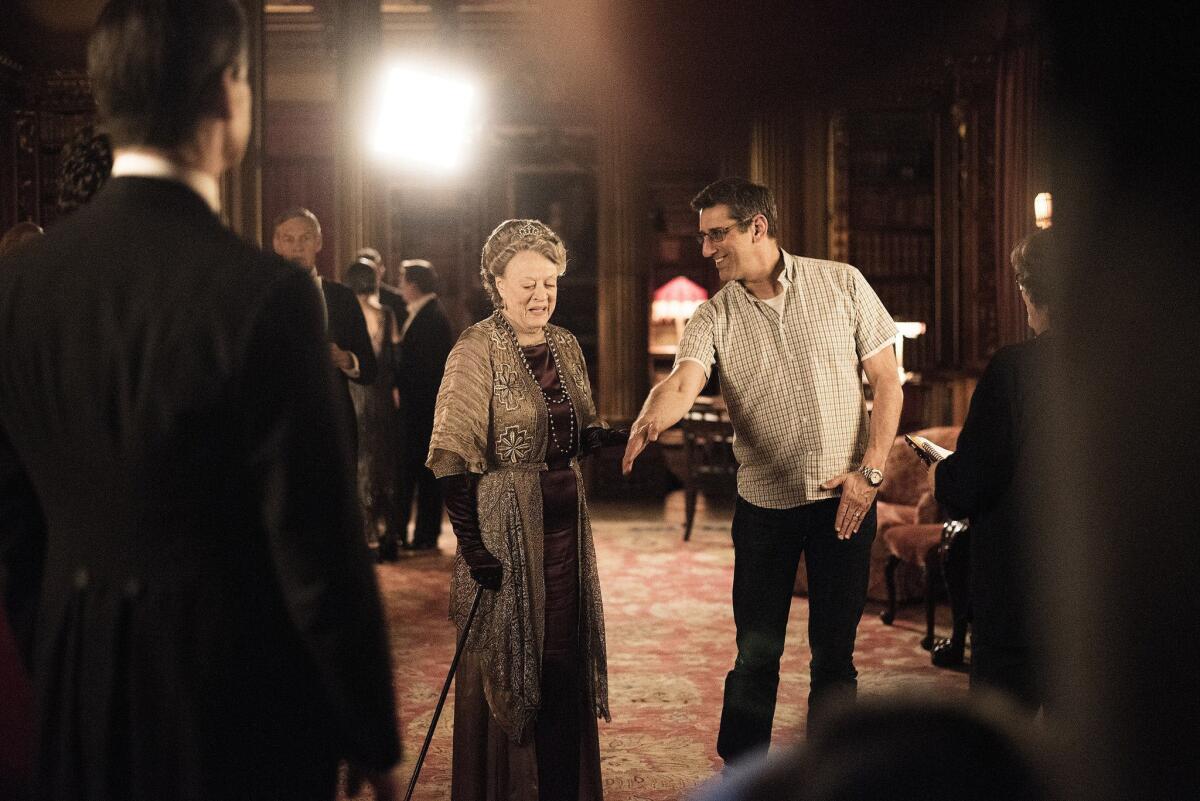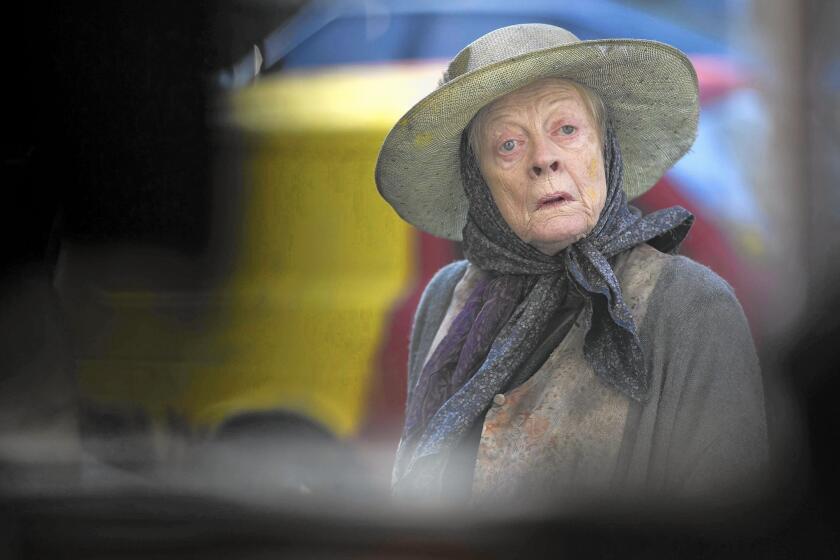Maggie Smith, ‘Harry Potter’ and ‘Downton Abbey’ actor, dies at 89

- Share via
For the record:
1:20 p.m. Sept. 27, 2024A previous version of this story misidentified the “Quartet” films.
Two-time Oscar winner Maggie Smith, the celebrated stage actress who starred in “The Prime of Miss Jean Brodie” and burnished her long-shining star by playing the scene-stealing dowager countess of “Downton Abbey” and the exacting Professor McGonagall in the “Harry Potter” franchise, has died. She was 89.
The respected English dame “passed away peacefully” early Friday in a London hospital, her sons, Chris Larkin and Toby Stephens, said in a statement to The Times.
“An intensely private person, she was with friends and family at the end. She leaves two sons and five loving grandchildren who are devastated by the loss of their extraordinary mother and grandmother,” they said in a statement issued through publicist Clair Dobbs.
Her sons did not disclose her cause of death in the statement. Smith had been candid about her health issues in the past, suffering from glaucoma, Graves’ disease and breast cancer, and she underwent hip-replacement surgery in her 80s. In their statement, her sons thanked the “wonderful staff at the Chelsea and Westminster Hospital for their care and unstinting kindness during her final days.”
During a career that spanned six decades, Smith acquired a large following on both sides of the Atlantic and became one of few to achieve the triple crown of acting — winning Academy, Emmy and Tony awards. She earned her Oscars playing the unconventional schoolmarm in “The Prime of Miss Jean Brodie” and a brittle movie star in “California Suite” in the 1970s. She also had four Primetime Emmys, three Golden Globes, a Tony, an Olivier Award and a slate of BAFTAs to her name.
The veteran performer famously summed up her career in a single sentence: “One went to school, one wanted to act, one started to act, and one’s still acting.”
Maggie Smith never failed to illuminate and astonish. As she aged, she showed us that the face and body may change, but the spirit need not falter.
Beginning her work in theater as a teen, Smith played Shakespeare’s Rosalind and Beatrice. She hit her stride with imperious characters and class-conscious snobs. A commanding presence on par with contemporaries Judi Dench and Vanessa Redgrave, Smith was awarded as a Companion of Honor by Queen Elizabeth in 1990. In person, Smith was funny, self-deprecating and down-to-earth.
“I’ll get restless unless I’m acting. That’s when I come really alive, you see,” she told The Times.
She alternated theater work with cinema and achieved Oscar nods for “Othello” (1965), “Travels With My Aunt” (1972), “A Room With a View” (1985) and “Gosford Park” (2001). In addition to “Downton Abbey” and the eight-film blockbuster “Harry Potter” saga, Smith starred in several projects teeming with established British talent, including the “Best Exotic Marigold Hotel” films and “The Lady in the Van.”
“I’ve had quite a range as an actress,” she quipped. “All the way from Desdemona to Virginia to acting with a pig in [1984’s] ‘A Private Function.’ ”
It’s been 60 years since Maggie Smith made her Broadway debut.
A key to her popularity with such disparate audiences was her range. Her late-onset acclaim as the loyal deputy headmistress charged with Gryffindor House in the much-hyped wizard franchise was to be expected. And while she was the first pick for the role, legions of young “Harry Potter” fans had never heard of Smith when she was cast. But her participation in the franchise brought new fans and great financial reward.
“Harry Potter is my pension,” she told the Telegraph.
In a Friday statement to The Times, the boy-wizard franchise star Daniel Radcliffe, who first met Smith when he was age 9 while reading scenes from “David Copperfield,” said that she put him “immediately at ease” during that shoot and that he was “lucky enough to go on working with her for another 10 years” on the “Harry Potter” films.
“She was a fierce intellect, a gloriously sharp tongue, could intimidate and charm in the same instant and was, as everyone will tell you, extremely funny,” the 35-year-old said. “I will always consider myself amazingly lucky to have been able to work with her, and to spend time around her on set. The word legend is overused but if it applies to anyone in our industry then it applies to her. Thank you Maggie.”
Smith said she read J.K. Rowling’s best-selling books and enjoyed playing the iconic transfiguration professor, regarding her time on the films as “surreal.” But the movies did not endear her to film acting, and she wasn’t always thrilled with the exposure the part gave her. Of “Downton Abbey,” ITV’s surprise mega-hit that resuscitated public broadcaster PBS in the United States, Smith said she never bothered to watch the series.
“Why do I want to see it?” she told The Times. “I’m doing it. I know the story of it. I do have the boxed set, but you know that would take me to the end of my life to watch.”
In a career of remarkable versatility, Maggie Smith revealed theatricality to be a mode of existence
Maggie Smith, who won two Academy Awards, five BAFTA Awards, four Emmy Awards, three Golden Globe Awards and a Tony Award, was at her best on screen when she could bring the stage with her.
She delighted in her later work, though lamented the demands of “Downton” and “Harry Potter,” as well as quitting the stage. The British national treasure made no conscious decision to stop theater but thinned out her commitments after her breast cancer diagnosis. Still, theater remained her first love.
“I feel more at ease in the theater than I do in life,” she told The Times in 2003. “What I find extraordinary in theater is the immediacy of working with an audience, a whole house full of people. To know you can have everybody listening and reacting to what you are doing, there’s nothing quite like that.”
Smith had a strict policy of not reading her reviews — and never used the internet — learning what was written about her only when her second husband, Beverley Cross, the late playwright, would allude to it after he scoured every line.
“I find if you do read the notices you start to play them. If the critics pick on one particular moment of your performance you become obsessed by it. So I don’t read them. My husband usually says something like: ‘They were OK. Don’t panic,’ and that’s enough for me,” Smith said in 1985.
Despite her reputation as being unpretentious, she acquired a notoriety on set, intimidating directors and costars. She said it was a product of fear and nerves.
“The awful thing is, I’m very aware when I’m being difficult, but I’m usually so scared. And that’s shaming, at the age one is,” she said.
But there was no use changing course so late into her career, and she said it would “frighten” coworkers if she were nicer.
“It’s gone too far now to take back,” she told the Telegraph. “If I suddenly came on like Pollyanna, it wouldn’t work — it would frighten people more if I were nice. They’d be paralyzed with fear. And wonder what I was up to. But perhaps I should try it … ‘Hello! What fun! We’re going to be here all day! And then filming all night too! Goodie!’ ”
Born Margaret Natalie Smith in 1934, she changed her name to Maggie Smith in 1956 when she registered with Equity, the British actors’ union, because Margaret Smith was taken.
Critic’s Notebook: Maggie Smith, the magnificent
She was born in the Essex suburb of Ilford, and there was little theatrical about her background: Her father, Nat, was a medical technician, and her Scottish mother, Meg, was a Presbyterian. Her brothers, Ian and Alistair, were twins six years older than her. The family moved to Oxford when she was 5, and suddenly she realized she wanted to act.
“I was totally obsessed, which confused my parents utterly. Both my brothers were architects, and they just didn’t know where it [her driving ambition] had come from,” she told the Telegraph.
Smith received little encouragement upon announcing her dramatic intentions — even her grandmother turned to her mother and said: “You simply can’t let her. Not with that face.”
After leaving Oxford High School for Girls at 16, her plans to go to London’s Royal Academy of Dramatic Art were foiled by her parents. They said that if she wanted to pursue her dream, she would have to stay in Oxford.
She joined the Oxford Playhouse School of Theatre, debuting at 17 as Viola in Shakespeare’s “Twelfth Night.” Her talent, immaculate timing and propensity for comedy were noted, with an Observer writer saying, “She looks as crisp as a celery stick and speaks like a girl who has a good mind of her own.”
Doing revues in Oxford and at festivals, producer Leonard Sillman saw her and “that’s how it happened,” Smith told The Times in 2016. At 21, she starred in Sillman’s musical comedy revue “New Faces of 1956” on Broadway and soon was a rising star.
She made her film debut in the 1958 crime drama “Nowhere to Go” with George Nader. Upon her return to Britain, Laurence Olivier invited her to join London’s Royal National Theatre, and she played Desdemona opposite Olivier in “Othello,” first on stage, then in the 1965 film version, for which she received her first Oscar nomination. It was a role that felt intimidating but propelled her career.
“It was scary,” she told The Times in 2016. “Shakespeare and I were a long way apart because I had been doing things like ‘New Faces’ and revues. I would have been terrified anyway just leaping into Shakespeare, but that was going in at a pretty dizzying level.”
Gasp! Maggie Smith has never seen an episode of ‘Downton Abbey’
Olivier had also recruited charismatic young actor Robert Stephens, with whom Smith immediately fell in love. The star couple’s onstage chemistry was palpable in “Hay Fever” and “Much Ado About Nothing,” which were big sellers at the box office.
They married in 1967 and had two sons, Christopher and Toby. Stephens’ alcoholism and instability eroded the union as Smith succeeded in film, while his career stalled out. They divorced in 1975. Four months after it was finalized, she reunited with Cross, whom she first met at a student revue at Oxford and later had an affair with during his first divorce. He divorced his second wife and they wed in a civil ceremony that year, and he took on Smith’s two sons as his own.
Smith and Olivier famously didn’t get along and, after her divorce, she and her family set off for Canada, where she spent four years with the Shakespeare Company at Stratford, Ontario. Under the direction of Robin Phillips, she tackled classical roles she hadn’t in London — Cleopatra, Rosalind and Lady Macbeth among them.
“It was wonderful,” she told the Telegraph, “like starting life all over again, really.”
In swinging 1960s London, when films featured fresh mini-skirted ingenues such as Julie Christie and Redgrave, Smith stood apart. Filmmakers picked up on her eccentric, mannered style and the so-called “Maggie Smith character” — the class-fixated braggart she perfected — was born.
“I think it’s just a question of people not knowing quite what to do with you,” she said.
Smith appeared on Broadway in 1975’s “Private Lives” and 1979’s “Night and Day.” Her 1970s film credits included “Love and Pain and the Whole Damn Thing,” “Murder by Death” and “Death on the Nile.” Alongside a cast that included Jane Fonda, Walter Matthau, Michael Caine, Bill Cosby, Richard Pryor and Alan Alda, Smith earned her second Academy Award playing Oscar-loser Diana Barrie, who finds herself among a motley crew of guests staying at a Beverly Hills hotel in Neil Simon’s 1978 “California Suite.”

Then came “Virginia,” the play about modernist writer Virginia Woolf in 1981. The show was so successful that it was taken to London. She also starred with Olivier and Harry Hamlin in Cross’ adaptation of the Greek epic “Clash of the Titans” and a slew of film comedies before landing in the 1985 Merchant Ivory production of E.M. Forster’s “A Room With a View.” The romantic drama was up for three Oscars, including best picture and supporting actress for Smith. It was her first pairing with Dench, a close friend who would work with her onstage in 2002 for David Hare’s “The Breath of Life,” in Charles Dance’s “Ladies in Lavender” (2004) and the “Marigold Hotel” films.
But it was “Quartet” that kept popping up on her résumé. She had first played Lois Heidler in James Ivory’s 1981 adaptation of the 1928 Jean Rhys novel. And in 2012, she appeared in a comedy bearing the same title about a home for retired musicians, which marked Dustin Hoffman’s directorial debut and a reunion with “Harry Potter” star Michael Gambon. (Gambon died on the same date as Smith in 2023.) Smith earned a BAFTA nomination for the former “Quartet” and a Golden Globe nomination for the latter.
Her nightly role as Lettice Douffet, the eccentric tour guide at the heart of Peter Shaffer’s comedy “Lettice and Lovage,” earned her a Tony Award for best actress when it hit Broadway in 1990. Contemporary film stars Alan Bates, Glenda Jackson and Redgrave were regulars on the West End, but Smith was among the British artists such as Anthony Hopkins and Dench who appeared at subsidized houses despite their flourishing film careers.
“You find that a lot of actors here — myself included — do film because you need that kind of money in order to work in the [subsidized] theater,” Smith said in 1988. “It used to be in this country that you either did films or you worked in the theater. We’re lucky to be around at a time when you can do both.”
The same year “Harry Potter and the Sorcerer’s Stone” hit theaters, Smith earned wide acclaim in Robert Altman and Julian Fellowes’ mystery-comedy “Gosford Park.” The 2001 film earned seven Oscar nominations, including best picture. Smith was nominated for supporting actress.
“I’m always in costume and period things, wandering around in wigs,” she told The Times in 2001. “If they want one of those snobbish English nasty people or whatever, I get into that bracket.”

Due to her age and health, Smith skipped several American awards shows in her later years even though she won multiple times for “Downton Abbey.” Her absence became a punchline at the 2016 Emmy Awards when host Jimmy Kimmel swiped her supporting actress trophy, saying they wouldn’t mail it but that she could get it at the lost and found.
Writing via the Masterpiece PBS Twitter account, Smith said: “I was very astonished and pleased to win the award. I feel the Emmys has been overly generous to me. If Mr. Kimmel could please direct me to the lost and found office I will try and be on the next flight.” She signed off on the post: “Love old Maggie.”
More to Read
The complete guide to home viewing
Get Screen Gab for everything about the TV shows and streaming movies everyone’s talking about.
You may occasionally receive promotional content from the Los Angeles Times.










